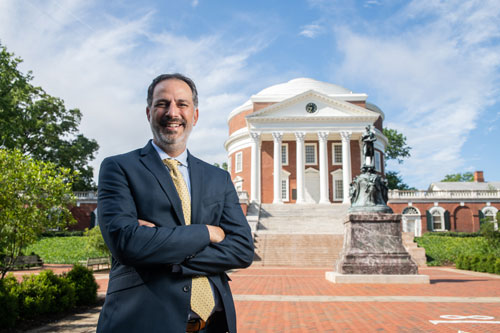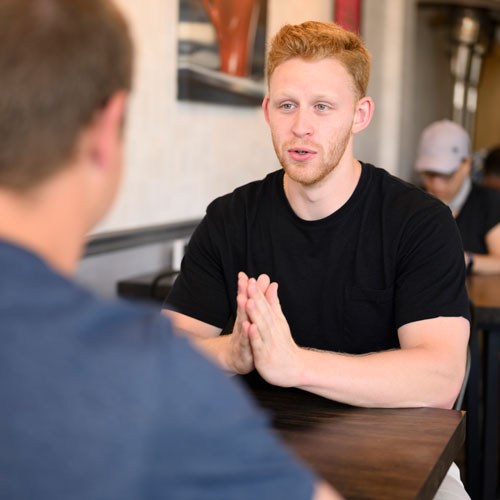The real world
Internship alternatives offer hands-on work experience
The real world
Internship alternatives offer hands-on work experience
In spring 2020, University of Virginia officials were left scrambling as thousands of students lost summer internships overnight due to the then-burgeoning COVID-19 pandemic.
Those precious 10- to 12-week gigs, during which students lay the groundwork for their post-college careers, were suddenly gone.
“We said, ‘We can’t just start calling more companies to get more internships. [The internships] just aren’t there,’” recalls David Lapinski, U.Va.’s director of employer relations and experiential education.
With students’ summer career-prep plans evaporating, leaders had days to develop new opportunities for them.
And COVID-19 forced them to rethink how they had always done things. As leaders reimagined how they could help students get hands-on job experience, questions that had been simmering in the career preparation world prior to COVID-19 were suddenly on the front burner.

For instance, what if dedicating a summer to one internship limited a student’s perspective?
And what if students were missing out on hard skills, such as being able to code in Python or build a digital marketing plan?
And what if tech-proficient students were floundering in first jobs because they lacked soft skills needed in any workplace?
In 36 hours, U.Va.’s Launchpad program was born.
A six-credit, all-online program starting its second year this summer, Launchpad may now be a better replica for the modern workplace than some pre-pandemic in-person programs.
Students in Launchpad study a mix of liberal arts and digital skills. And they get hands-on experience, working in teams remotely with real-world companies on real-world problems.
Elli Perkins, an anthropology major from Chesterfield County, enrolled in Launchpad in summer 2020, taking “boot camp” courses in digital marketing and branding. She consulted with a beauty company on its branding efforts and created a digital marketing campaign for a food blog.
“It gives you such a wide range of exposure to show you what you like and what you don’t like,” Perkins says. “You come out with tangible projects that really gave me a great taste for what those careers would be like.”
Launchpad is just one such new avenue at U.Va., but it is indicative of how attitudes toward career preparation are shifting.
Skill building
No one’s saying the old model is dead. Students still need help developing résumés, learning how to interview for jobs and building experience and connections through internships.
But schools are feeling the pressure from both sides — companies want graduates with a diverse skill set, and graduates don’t want to be discouraged if they realize they aren’t a match for their chosen career.
“The traditional way of career services had been to engage the company, get them to come to [the university] and do the recruiting,” Lapinski says. “It hasn’t been hands-on, immersive and experiential … and too many employers lose employees within six months.”
University leaders have long known that the divide between liberal arts and the hard sciences is far more pronounced on campus than it is in the workplace.
Alex Hernandez, dean of the U.Va. School of Continuing and Professional Studies, says employers don’t differentiate between “hard skill” and “soft skill” employees. “They want you to have both.”
It was a lesson Hernandez learned vividly during his first job working on Wall Street as a financial analyst after graduating from college in 1996. “While they really cared whether I could write [and] whether I could think analytically, honestly they spent the first six months training me on whether I could use Microsoft Excel without a mouse,” Hernandez remembers.
At the time, however, mastering all the Excel shortcuts was a vital skill for a financial analyst who had to be quick.
The boot camps within Launchpad cover both specialized digital skills that a student may miss in their traditional coursework, along with writing, communication and teamwork skills that employers often don’t have the time or desire to teach.
“There is a whole new set of digital skills that are basic table stakes for getting into a career,” Hernandez says. “What we are trying to figure out at U.Va. is how do you create these really meaningful programs that prepare students for the world of work that also teach the human skills we know we need for long-term career success?”
Growth opportunity
The marriage of hard and soft skills might be receiving renewed emphasis in career prep offices, but it is not a new idea.

Kevin Cao, a 25-year-old U.Va. graduate now working with Deloitte, encourages current college students to assess their skill deficits and then get involved in something that will stretch them.
Cao, a Spanish and global studies major, traveled to Nicaragua during the summer after his sophomore year to work alongside biology and engineering students.
The five-member team was tasked with helping a nongovernmental organization determine the best way to clean up the drinking water in a rural community. They distributed disposable cameras and asked community members to take pictures of problem areas that were contaminating the water. Cao facilitated meetings with locals during which they would review photos of dirty wells, dilapidated structures crumbling into the water supply or people crossing the river on horseback.
It was a classic consulting gig and Cao says it wasn’t that different from working at Deloitte.
“We help our clients achieve their strategic goals,” Cao says. “That’s just fancy speak for what we did in Nicaragua, but now it’s for a Fortune 500 company or an American nonprofit.”
Like Cao, recent U.Va. graduate Myles McPartland also immersed himself in a project that helped him grow.
McPartland describes himself as a naturally shy introvert from Stephens City, a small town near Winchester.
As a first-year student in U.Va.’s McIntire School of Commerce, McPartland joined CASH — Creating Assets, Savings and Hope — a tax preparation club that is part of the Madison House, a student volunteer nonprofit in Charlottesville. The club helps low-income families in Albemarle County file their taxes, and McPartland began meeting with strangers to discuss their finances every week.
“I was really scared,” he says. “I was this 18-year-old kid filing someone’s taxes and being responsible for a bunch of money for the client.”
He eventually became the program director for CASH during his final year, overseeing a program with 250 student volunteers who complete thousands of tax returns for millions in tax refunds each year.
The “shy kid” was now dealing with clients who wanted to fudge the numbers on their returns, confronting absentee volunteers and selling the club’s mission to hundreds of potential recruits. During the pandemic, he had to reorganize CASH’s entire operations to go virtual. With the social element gone, McPartland also had to keep his team motivated as they slogged away at their parents’ homes, working on tax returns for people they would never meet.
Before he arrived at U.Va. and joined CASH, skills like leading a team, making split-second decisions and being assertive were well beyond his wheelhouse. But all those experiences gave McPartland plenty of fodder for the inevitable “Tell me about a time when …” question asked by job interviewers.
And that experience also helped him land a job this summer as a proprietary trader for New York-based investment firm Apex Capital Holdings LLC. McPartland is confident that his four years in CASH equipped him with vital skills for a career working on a team that makes rapid-fire stock market decisions.
“It gives you so many soft skills — teamwork, communication, talking to people,” he says. “A lot of growth comes from that.”
‘Micro-experiences’
McPartland always knew he wanted to go into finance. But most other students don’t have such a specific ambition.
That’s why, alongside Launchpad, U.Va. last summer also launched Propel — a year-round workforce training program that gives students opportunities to work on as many as five different projects, helping companies solve real-world problems. Sessions can range from a few weeks to a semester, and some offer course credit.
U.Va. partnered on the project with the Central Virginia Small Business Development Center, which helped connect students with businesses in the surrounding
counties that needed assistance with projects, such as a coffee shop that wanted to explore whether it would be profitable to also sell CBD products. With the center’s help, students also aided local governments, creating online platforms for small businesses to communicate needs to localities. Another project involved helping Orange County come up with a campaign to revitalize its Black business community.
“I have been so impressed with the quality of the [Propel] program, the ease with which they provide these services and the sheer volume of work that the students are doing,” says Rebecca Haydock, director of the Central Virginia Small Business Development Center. “The students have taken every issue that has been put in front of them seriously and come up with solutions that have shocked and amazed all of us. … Their research is first-class [and] their presentations are creative, professional and thoughtful.”
The opportunity to dive into up to five different projects is ideal for students who may not yet have chosen a career, Lapinski says. For these students, it can be a better use of time than an internship.
“These are micro-experiences,” he explains. Unlike a traditional 12-week internship, which is spent at one location, Propel offers students a chance to explore several types of businesses and pick up new workforce skills from each.
And one the most valuable outcomes of programs like Propel and Launchpad, Lapinski adds, is helping students realize what they do and do not want to do.
Elli Perkins, the anthropology major who completed Launchpad last summer, ended up changing her career ambitions after completing the program.
She went into Launchpad as a liberal arts major interested in digital marketing and branding. But through her time in Launchpad, she learned she didn’t want to pursue those fields.
Perkins left with a new career focus: Becoming a nurse.
The intense career prep realigned her thinking toward a goal that had been in the back of her mind since seeing her little brother spend time in the neonatal intensive care unit.
“I needed the program to show me how much I wanted to do that,” she says.
Lapinski says the onus is on educators to develop opportunities for students like Perkins to dip their toes in all sorts of different fields, developing new skills and getting a taste of life after college.
“In career services, we still have to focus on résumé writing, cover letters and how to interview,” Lapinski says. “But we believe we need to do these additional programs focused on [workforce] experience and skills to help students grow in all aspects of their career development.”
The University of Virginia at a glance
Founded
Sometimes called Mr. Jefferson’s university or just The University, U.Va. was founded by Thomas Jefferson in 1819. Its first board of visitors included Jefferson and fellow U.S. presidents James Madison and James Monroe.
Campus
With roughly 1,240 contiguous acres around its UNESCO World Heritage Site campus, U.Va. is known for its distinctive Jefferson-designed Rotunda building located on The Lawn, the school’s 35-acre grass quad. U.Va.’s other major holding is the University of Virginia’s College at Wise, a four-year liberal arts college in Southwest Virginia.
Enrollment
About 17,700 undergraduate students
About 6,800 graduate students
About 2,500 international students
40% minority enrollment
69% in-state undergraduate students
Employees
Approximately 4,300 faculty, 16,300 staff and 12,000 UVA Health employees
Academic programs
Notable for its medicine, law and nursing schools, U.Va. offers more than 120 majors across 12 schools.
Tuition, fees, housing and dining*
Includes average room and board, plus books and other expenses
In-state residents: $34,560
Out-of-state residents: $69,090
*Note: Costs may differ depending on academic program.






















